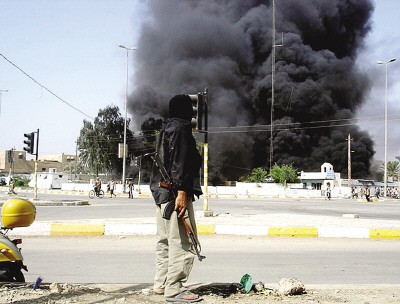Sadr militia briefly seizes Amara in south Iraq

 BAGHDAD, Oct. 20 -- Members of the Mahdi Army, a powerful Shiite militia headed by firebrand cleric Moqtada al-Sadr, briefly took over the southern Iraqi city of Amarah and battled with the local Shiite police before withdrawing on Friday, in a bloody feud that illustrated deepening rifts within Iraq's largest sect and the growing turmoil in the south.
BAGHDAD, Oct. 20 -- Members of the Mahdi Army, a powerful Shiite militia headed by firebrand cleric Moqtada al-Sadr, briefly took over the southern Iraqi city of Amarah and battled with the local Shiite police before withdrawing on Friday, in a bloody feud that illustrated deepening rifts within Iraq's largest sect and the growing turmoil in the south.As many as 25 people, including 10 policemen, were killed in street fighting and mortar attacks that raged in Amarah, a predominantly Shiite city about 190 miles southeast of Baghdad, from midday Thursday until about 2 p.m. Friday. The militia attacked the headquarters and two stations of the city police department, which is reportedly aligned with the Badr Brigades, an arm of the Supreme Council for the Islamic Revolution in Iraq, a powerful Shiite religious party.
Each side blamed the other in a cycle of retaliatory clashes with tribal overtones.
Residents reached by telephone said the conflict began when a police intelligence chief with the Supreme Council was assassinated, and police responded by arresting the brother of a local Mahdi Army chief.
Negotiations to release him broke down, they said, and at about 1 p.m. on Thursday members of the Mahdi Army attacked three police facilities with mortar fire and rocket-propelled grenades. The militia imposed a curfew and patrolled the streets with loudspeakers, ordering residents to stay inside.
The takeover ended, according to Maj. Charlie Burbridge, a British military spokesman, "when Moqtada al-Sadr told them to stop. The situation now is calm but tense."
Burbridge said about 200 to 300 gunmen were involved in the attacks. He said the local police chief said that 10 of his men were killed and that police killed 15 members of the militia and wounded 90.
Burbridge said police officers were back in their stations and in control of the streets. He said 220 Iraqi army troops were in the town supporting them, and that 700 more Iraqi soldiers and 500 British troops were on standby to go if requested.
British troops withdrew from Amarah, the capital of Maysan province, two months ago after their camp came under repeated mortar fire from Shiite militiamen identified by local residents as members of the Mahdi Army.
Southern Iraq, a Shiite stronghold, has generally been spared the intense bloodletting that terrorist attacks and sectarian violence have brought to much of the rest of the country. But the Mahdi Army's takeover of Amarah, even if only temporary, is another sign that the south is becoming more restive as the rest of the country slips toward open civil war.
It also is a stark illustration of the deepening tension among Shiite leaders as the United States pushes the government of Prime Minister Nouri al-Maliki to rein in militias, particularly Sadr's. The Mahdi Army has openly fought U.S. forces and has been accused of ruthlessly attacking Sunni Arabs and forcing them from their homes and towns. The fierce struggle between Shiite factions at the local level mirrors that at the national level, where the same groups are flexing their political and military muscle in a battle for control.
Read the rest at the Washington Post
Related Link:
Iraq PM seeks assistance of Shiite clerics al-Sadr, Sistani
Related Link:
Iraq PM: Disarming militias on hold; U.S. over-reliant on force; Rejects U.S. Sadr city attack
Related Link:
Sadr bids to rein in militia as Iraq violence rages
Related Link:
Sources: Sadr seeking better control of Mahdi Army, orders followers to lay down arms
Related Link:
U.S.: al-Sadr losing control of Mahdi Army

<< Home